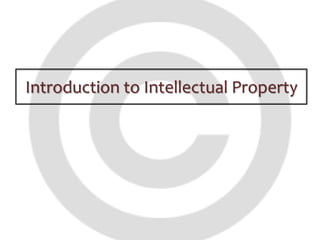
Introduction to intellectual property oct 2011
- 1. Introduction to Intellectual Property
- 2. The Information Society As you may recall, we live in what is referred to as an “information society”. Indeed, our culture, economy, occupations and technological innovations are all by-in-large based on a ceaseless exchange of information. Whether you’re using Facebook for entertainment, Blackboard for schoolwork, a cell phone to set a dentist appointment, or a word processing program to create a résumé, you’re clearly an active part of this information society. Did you know, though, that you could also be part of an extensive but loosely organized criminal network that illicitly exploits the technology and information at its disposal? If you’ve ever illegally copied a song, as 9 out of 10 college students have, then you’re part of this network (Lysonski and Durvasula, 2008; 171).
- 3. The Concept of Intellectual Property: An Overview The concept of intellectual property was in existence far before we became an information society. In fact, Noah Webster, of Webster’s Dictionary fame, effectively lobbied for some of the first copyright legislation in the U.S. right after the Revolutionary War in order to keep people from stealing his work and profiting from it. Then as now, people viewed expressions as tangible goods or “properties” that should be protected against theft. What has changed, however, is that information has become ubiquitous and relatively easy to obtain for an increasing number of people. Indeed, with the advent of the Internet we are saturated with an endless stream of information that appears to be “free”. However, some of that “free” information (an unacknowledged quote, an uncredited image, or a copied song) may have been illegitimately obtained and used.
- 4. Copyright and Plagiarism As you might well imagine, intellectual property can be a rather arcane, complex and wide-ranging area of study. For the purposes of this class, we’ll narrow the field and introduce two issues particularly relevant to students studying information literacy and trying to make sense of their rights and responsibilities in the information society. Copyright Plagiarism
- 5. A Definition of Copyright According to the World Intellectual Property Organization (WIPO), “Copyright relates to artistic creations, such as books, music, paintings and sculptures, films and technology-based works such as computer programs and electronic databases […] The expression copyright refers to the main act which, in respect of literary and artistic creations, may be made only by the author or with his authorization. That act is the making of copies of the work [...] The most important feature of any kind of property is that the owner may use it exclusively, i.e., as he wishes, and that nobody else can lawfully use it without his authorization […] There are two types of rights under copyright. Economic rights allow the rights owner to derive financial reward from the use of his works by others. Moral rights allow the author to take certain actions to preserve the personal link between himself and the work.” From WIPO’s “Understanding Copyright and Related Rights”
- 6. An Explanation of Copyright So what does all of that mean exactly? Professor Maggie Lange provides a brief, straightforward explanation of copyright.
- 7. Copyright and Piracy Music piracy is one copyright issue that continues to be a major concern all over the world. Over the past 10 years, Napster, Pirate Bay and other sites that allow peer-to-peer file sharing have been involved in high profile litigation cases which have divided fans, entertainers and music industry executives. As technology advances and consumer expectations continue to change, this issue will doubtlessly grow in significance. Brett Winn, from What You Ought to Know, provides an entertaining but accurate summary of piracy.
- 8. Plagiarism Plagiarism is another violation of author rights. While plagiarism may occur outside of an educational setting, people tend to most often associate it with schoolwork. Plagiarism is considered such a serious offense that every college and university has a policy addressing it. ESU’s policy defines it as “presenting as one's own the intellectual or creative accomplishments of another without giving credit to the source or sources” ("Academic Dishonesty Policy,", 2011). The university reserves the right to fail or expel students who’ve engaged in the act.
- 9. Why is Plagiarism a Big Deal? Most academics take pride in their research and writing. As a consequence, they choose to adhere to a professional code that honors intellectual integrity. Like Noah Webster, they wish to be given credit and, in some cases, compensation for the work they have produced. After all, it’s a matter of their reputations and livelihood. Academics also take pride in having their work referenced. Quite simply, it helps to validate the significance of their ideas and underscores their contribution to their chosen field. In short, they actually want you to use their work, but only if you give them credit for it through proper citations.
- 10. Conclusion While this lecture is a selective overview of two major aspects of intellectual property, it should provide you with some sense of the ethics, responsibilities and rules involved with using the vast amount of information at your disposal. As Standard Five of the “Information Literacy Competency Standards for Higher Education” (2000) maintains, “The information literate student understands many of the economic, legal, and social issues surrounding the use of information and accesses and uses information ethically and legally” (14). To fully master this standard, I encourage you to further explore how intellectual property affects your life.
